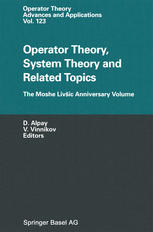

Most ebook files are in PDF format, so you can easily read them using various software such as Foxit Reader or directly on the Google Chrome browser.
Some ebook files are released by publishers in other formats such as .awz, .mobi, .epub, .fb2, etc. You may need to install specific software to read these formats on mobile/PC, such as Calibre.
Please read the tutorial at this link: https://ebookbell.com/faq
We offer FREE conversion to the popular formats you request; however, this may take some time. Therefore, right after payment, please email us, and we will try to provide the service as quickly as possible.
For some exceptional file formats or broken links (if any), please refrain from opening any disputes. Instead, email us first, and we will try to assist within a maximum of 6 hours.
EbookBell Team

4.8
44 reviewsThis volume presents the refereed proceedings of the Conference in Operator The ory in Honour of Moshe Livsic 80th Birthday, held June 29 to July 4, 1997, at the Ben-Gurion University of the Negev (Beer-Sheva, Israel) and at the Weizmann In stitute of Science (Rehovot, Israel). The volume contains papers in operator theory and its applications (understood in a very wide sense), many of them reflecting, 1 directly or indirectly, a profound impact of the work of Moshe Livsic. Moshe (Mikhail Samuilovich) Livsic was born on July 4, 1917, in the small town of Pokotilova near Uman, in the province of Kiev in the Ukraine; his family moved to Odessa when he was four years old. In 1933 he enrolled in the Department of Physics and Mathematics at the Odessa State University, where he became a student of M. G. Krein and an active participant in Krein's seminar - one of the centres where the ideas and methods of functional analysis and operator theory were being developed. Besides M. G. Krein, M. S. Livsic was strongly influenced B. Va. Levin, an outstanding specialist in the theory of analytic functions. A by deep understanding of operator theory as well as function theory and a penetrating search of connections between the two, were to become one of the landmarks of M. S. Livsic's work. M. S. Livsic defended his Ph. D.